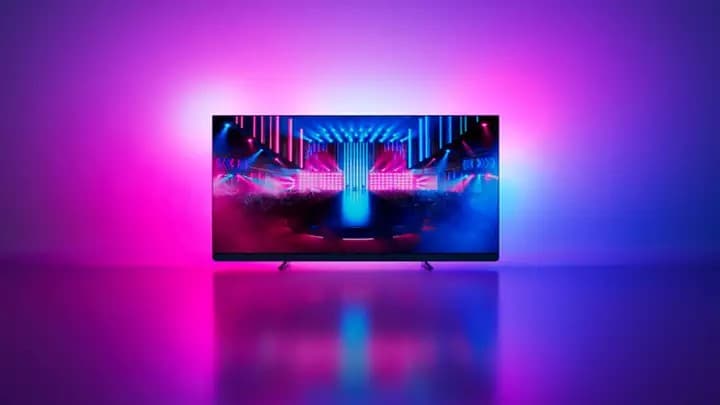
What is Ambilight TV? Why should you have one?

There’s lots of hype around AI, today. But AI can boost the Ambilight TV’s performance in very real ways, with smarter picture processing, slicker gaming, more immersive Ambilight, and improved energy efficiency. We look at how, below.
First up: some definitions. As many people will know, AI stands for Artificial Intelligence. That’s where computers and machines can perform tasks once only humans could do. And a TV is, well. . . you’re probably good with that one.
Again, you may know this already. But the names are suspiciously close. So, here’s a quick recap. Smart TV: A smart TV connects to the internet and lets people stream their favourite shows, listen to music, and play games online. It might even connect to other smart devices around home, so people could boss around their thermostat from the couch, if they wanted. Today, most new TVs are smart TVs. AI TV: Some smart TVs can also perform tasks using AI. We’ll get to what those might be in a sec.
The short answer is to give Ambilight TV lovers the best experience possible: best picture, best sound, best atmosphere, best energy efficiency, best everything.
The full answer is much more interesting. That’s because what “best” means really depends on what you watch, when, and where - as well as on your own personal preferences.
If you’re chasing the best, you could spend your whole TV-viewing life painstakingly optimising your TV settings, object by object, frame by frame.

Alternatively, you could let your Ambilight TV do all the hard work for you, automatically. And, for that, you need AI.
Ambilight TVs use AI to understand what’s going on, on-screen and in the room around you, interacting with advanced algorithms inside your Ambilight TV to optimise picture, Ambilight, and gaming performance.
Scene optimisation As we’ve covered, picture quality is always a battle between competing priorities. Which one wins depends on what you’re watching.

Take smoothness and detail, for example. With cartoons, we want surfaces to appear smooth and even. Treat human faces in the same way and they look weirdly plastic. Pores and pimples reassure us that we’re looking at a real person.
Scene Optimisation uses AI to sort what’s on screen into categories - landscape, face, action, night, sports, cartoon - and tweak setting like sharpness, noise reduction, smoothness, motion, colour, and detail, to suit.
Ambient sensing Another way Ambilight TV uses AI is to match picture to the prevailing light conditions in the room.
Human eyes are incredibly smart. They are constantly adjusting to the light around us. Think how a few minutes in the dark you begin to see clearer. Or how, after putting on tinted sunglasses, you forget you’re even wearing them.

When it comes to watching TV though, this poses some challenges. As our eyes adjust, what looks white in a certain light might take on a grey, blue, or yellow tinge in another.
This is where Ambient Sensing comes in. At the front of the Ambilight TV is a tiny optical module, a bit like a single-cell solar panel, which measures the intensity and colour temperature of the light in the room. Using AI, Ambilight TV then adjusts the picture so that whites always appear white, while colours stay true.
As well as making picture processing more intelligent, AI can also optimise Ambilight TV for gaming.
What we perceive as video is just a procession of still images. To make this as smooth as possible, TVs normally hold the first image in memory for a split second longer than the rest. For watching TV, it’s perfect. The action looks fluid and that tiny instant of delay speeds past, unnoticed.

This isn’t the case with gaming, where response time is everything and even a fraction of a second can spell the difference between life and death.
Using AI, Ambilight TV recognises when it’s time to get serious. The moment you turn on your game console, it activates an automatic game mode to reduce latency and boost the chances of survival - without you having to lift a finger.
Ambilight style Just as there’s no one-size-fits-all rule for picture quality, the same is true for Ambilight Style, the way Ambilight reacts to what’s on screen.
When there’s more happening - as with sports or gaming - many of us prefer Ambilight to react more dynamically to the changing action. But no one wants to press pause, rummage through settings, and change the Ambilight Style just as things get interesting.

With AI, Ambilight TVs can identify the genre of the content and choose the right Ambilight Style. So, it always complements and enhances what you’re watching or playing.
Eco room adaptive The second way Ambilight uses AI also has to do with light conditions in the room, to make Ambilight only as bright as you need. Remember that tiny optical sensor at the front of Ambilight TV? It also feeds Ambilight TV with the information it needs to adjust the intensity of Ambilight’s glow. Giving you full power only when necessary, like when the room is very bright. And saving energy when you don’t.

We’re continuously training our AI models so that they get better and better at recognising and optimising for different content.
All that training happens in a closed lab, in Ghent, and never using data from your Ambilight TV at home. But the learning is passed on. When you update your Ambilight TV software, you automatically receive the latest, most capable version, helping to future-proof your Ambilight TV.
So far, we’ve only discussed AI in picture, gaming, and Ambilight. Our engineers are working hard to apply what we’ve learned to sound, too. Stay tuned, there’s more AI news to come.
OLED+
4K Ambilight TV
65OLED950/12
OLED+
4K Ambilight TV
65OLED910/12
OLED
4K Ambilight TV
65OLED810/12
OLED
4K Ambilight TV
65OLED760/12
Philips TV
Philips Sound
Support
Let’s connect

You are about to visit a Philips global content page
Continue